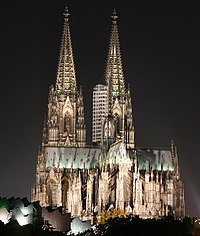Roman Catholic Church in Germany
|
Catholic Church in Germany |
|
|---|---|
| German: Katholische Kirche in Deutschland | |

|
|
| Type | National polity |
| Classification | Catholic |
| Polity | Episcopal |
| Governance | German Bishops' Conference |
| Pope | Pope Francis |
| Chairman | Reinhard Marx |
| Primas Germaniae | Franz Lackner |
| Apostolic Nuncio | Nikola Eterović |
| Region | Germany |
| Language | German, Latin |
| Founder | St. Boniface, by tradition |
| Origin | Claims continuity in Germania c. 754; Germanic Christians since 300s, some Arians |
| Members | 23,6 million (28.5 %) (2016) |
| Official website | German Bishops' Conference |
The Catholic Church in Germany (German: Katholische Kirche in Deutschland ) is part of the worldwide Catholic Church in communion with the Pope, assisted by the Roman Curia, and of the German bishops. The current "speaker" (i.e., the chairperson) of the episcopal conference is Cardinal Reinhard Marx, metropolitan Archbishop of Roman Catholic Archdiocese of Munich and Freising. It is divided into 27 dioceses, 7 of them with the rank of metropolitan sees. All the archbishops and bishops are members of the Conference of German Bishops. Due to a church tax compulsory for those who register civilly as Catholics, it is the wealthiest part of the Catholic Church in Europe.
Secularization has had its impact in Germany as elsewhere in Europe; nevertheless, 28.9% of the total population is Catholic (23.761 million people as of December 2015), down 4% compared to the year 2000. Before the 1990 unification of the Federal Republic of Germany (or West Germany) and the German Democratic Republic (or East Germany), Catholics were 42% of the population of West Germany. What makes it easier to know religious statistics in Germany is that Christian taxpayers must declare their religious affiliation as church tax is deducted by the state to be passed on to the relevant church in the state where the taxpayer lives.
...
Wikipedia
